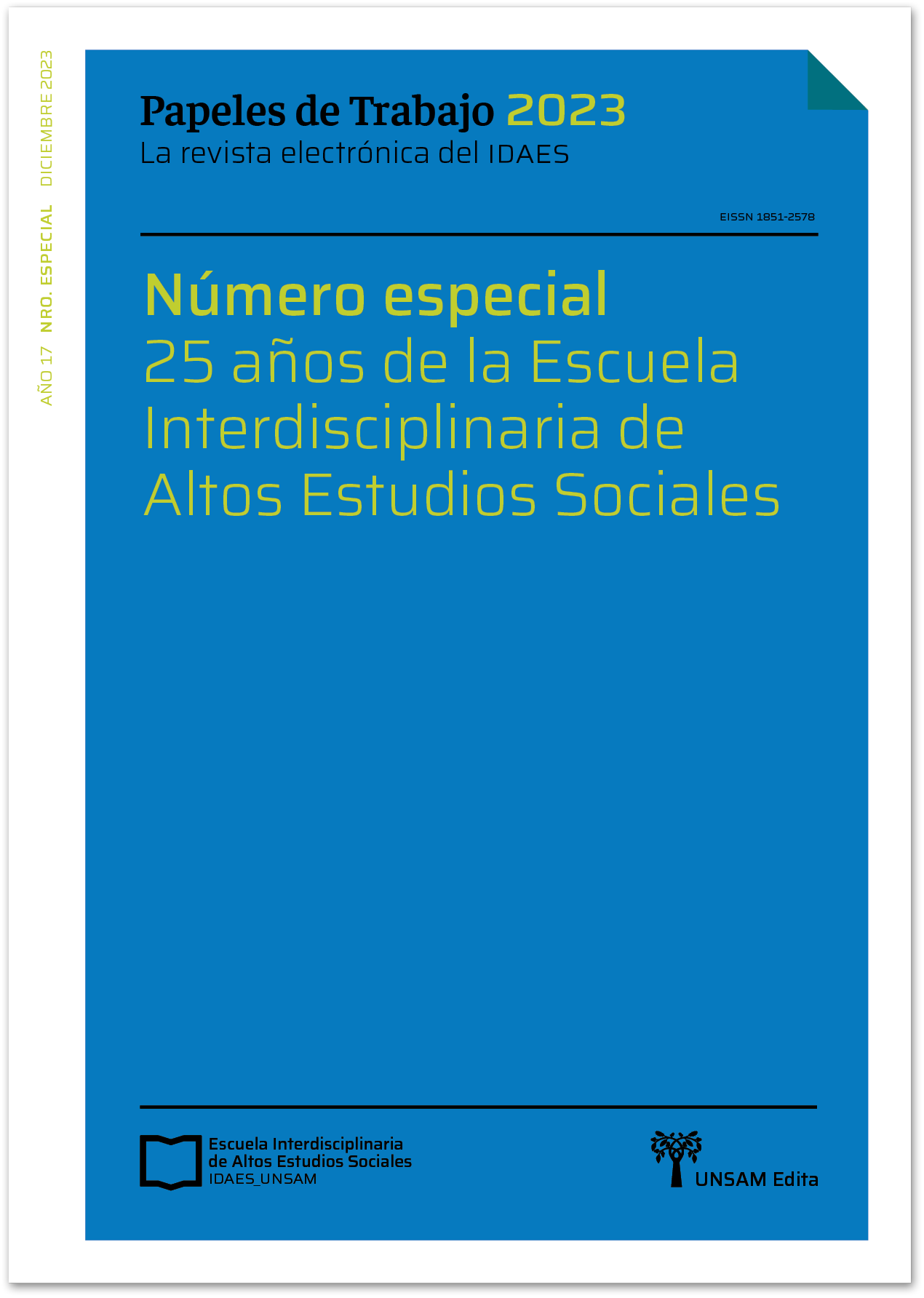Modernos, hábiles y entrometidos
Aportes para una socioantropología de la intimidad
Keywords:
Intimacy, Modernity, Postcoloniality, Overlapping spheres, Institutions, Latin AmericaAbstract
In the text we analyze the double way intimacy is defined, constructed, and transformed by the public, the market, and politics, meanwhile these are transformed by intimacy. The main ideas that we understand to account for our reflections on intimacy grouped into a) the ways that public and private spheres delimit, recreate, overlap, and dialogue each other, shaping the senses of intimacy; b) the relationship between institutions (formal and informal, weak, or strong) and the senses and experiences of intimacy; c) the used skills in the negotiation, intersections, interferences, and separations between spheres. We argue that the flexible nature of the category “intimacy” is what allowed us to pivot between the themes of care and emotions that we were addressing in our research. We found that flexibility made possible the creation of different ways of thinking about productive overlaps and intersections. We consider important to reflect on the intersectional combination of class, gender, and generation to restore the complexity and hybrid character of social relations. That is why we can analyze our contemporaries’ complex realities.
References
Abramowsy, Ana y Santiago Canevaro (comps.) (2016). Pensar los afectos. Aproximaciones desde las ciencias sociales y las humanidades. Buenos Aires: UNGS Editorial.
Abu-Lughod, Lila (1986). Veiled Sentiments: Honor and Poetry in a Bedouin Society. Nueva York: Oxford University Press.
Abu-Lughod, Lila y Lutz, Catherine (1990). Introduction: Emotion, discourse, and the politics of everyday life. En L. Abu-Lughod, y C. Catherine (Eds.), Language and the politics of emotion, (pp. 1-23). Nueva York: Cambridge University Press.
Arfuch, Leonor (2004). La visibilidad de lo privado: nuevos territorios de la intimidad. Revista Mundo Urbano, 12.
Arfuch, Leonor (2005). Cronotopías de la intimidad. Buenos Aires: Paidós.
Berlant, Laurent (2008). The Female Complaint: The Unfinished Business of Sentimentality in American Culture. Durham,: Duke University Press.
Boris, Eileen y Rachel Salazar Parreñas (2010). Intimate Labors. Cultures, Technologies and the Politics of Care. Stanford: Stanford University Press.
Canevaro, Santiago y María Victoria Castilla (2021). Masculinidad, intimidad y cuidados: ¿nuevas reconfiguraciones en la pandemia? Revista Brasileira de Sociologia da Emoção, 20(58), 97-113.
Canevaro, Santiago (2020). Como de la familia. Afecto y desigualdad en el trabajo doméstico. Buenos Aires: Prometeo.
Canevaro, Santiago (2014). Afectos, saberes y proximidades en la configuración de la gestión del cuidado de niños en el hogar: Empleadas y empleadoras del servicio doméstico en la Ciudad de Buenos Aires. Trabajo y Sociedad, 22, 175-193.
Castilla, María Victoria (2020). Cuidados paternos en barrios pobres de Buenos Aires, Argentina. Publicar en Antropología y Ciencias Sociales, 29(12), pp. 56-76.
D’Emilio, John y Estelle Freedman (1988). Intimate Matters: A History of Sexuality in America. New York: Harper and Row.
Fridman, Daniel (2018). ¿Cuánto vale la neurosis? En A. Wilkis (Ed.), El poder de (e)valuar. La producción monetaria de jerarquías sociales, morales y estéticas en la sociedad contemporánea. Bogotá: Editorial Universidad del Rosario.
Giddens, Anthony (1992). La transformación de la intimidad. Madrid: Ediciones Cátedra.
Gross, Neil y Solon Simmons (2002). Intimacy as a Double-Edged Phenomenon? An Empirical Test of Giddens. Social Forces, 81(2), pp. 531–555.
Hickey-Moody, Anna (2013). Affect as method: feelings, aesthetics and affective pedagogy. En R. Coleman y J. Ringrose (eds.), Deleuze and Research Methodologies (pp. 79-95). Edinburgh: Edinburgh University Press.
Hochschild, Arlie (1983) The Managed Heart: Commercialization of Human Feeling. Berkeley: University of California Press.
Hochschild, Arlie (2008). Introducción. Las dos caras de una idea. En La mercantilización de la vida íntima. Apuntes de la casa y el trabajo (pp. 11-21). Madrid: Katz.
Hochschild, Arlie (2003). The Commercialization of Intimate Life: Notes from Home & Work. Berkeley: University of California Press.
Hochschild, Arlie (1979). Emotion Work, Feeling Rules, and Social Structure. American Journal of Sociology, 85(3), 551–575.
Illouz, Eva (2007). Intimidades congeladas. Las emociones en el capitalismo. Madrid: Katz.
Meillassoux, Claude (1975). Mujeres, graneros y capitales. Economía doméstica y capitalismo. México: FCE.
Nehring, Daniel. (2014). Negotiated Familism: Intimate Life and Individualization Among Young Female Professionals from Mexico City. Canadian Journal of Latin American and Caribbean Studies, 36, 165-196.
Neiburg, Federico (2003). Intimidad y esfera pública. Política y cultura en el espacio nacional argentino. Desarrollo Económico, 43(170), 287-303.
Noel, Gabriel (2018). ¿Cuánto vale vivir en el "paraíso? Valuaciones monetarias y morales en un mercado inmobiliario de la costa atlántica argentina. En A. Wilkis (Ed.), El poder de (e)valuar. La producción monetaria de jerarquías sociales, morales y estéticas en la sociedad contemporánea. Bogotá: Editorial Universidad del Rosario.
Núñez Noriega, Guillermo (2007). Masculinidad e intimidad: identidad, sexualidad y sida. Ciudad de México: PUEG-UNAM/El Colegio de Sonora/Porrúa.
Plummer, Ken (2003). Intimate Citizenship: Private Decisions and Public Dialogues. Seattle: University of Washington Press.
Sertaç, Sehlikoglu (2015). Intimate publics, publics intimacies: natural limits, creation and the culture of Mahremiyet in Turkey. The Cambridge Journal of Anthropology, 33(2), 77-89.
Stoler, Ana Laura (Ed.) (2006). Haunted by Empire: Geographies of Intimacy in North American History. Durham: Duke University Press.
Tronto, Joan (1993). Moral Boundaries. A Political Argument for an Ethic of Care. Nueva York: Routledge.
Beck, Ulrich y Elisabeth Beck-Gernsheim (2003). La individualización: el individualismo institucionalizado y sus consecuencias sociales y políticas. Barcelona: Paidós Ibérica.
Weeks, Jeffrey (1992). Sexualidad. México D.F.: Paidós.
Wilkis, Ariel. (2020) Las sospechas del dinero. Moral y economía en la vida popular. Buenos Aires: Paidós.
Wilson, Ara (2012). Intimacy: A Useful Category of Transnational Analysis. En G. Praj y V. Rosner (Eds.) The Global and the Intimate (pp. 31-56). New York: Columbia University Press.
Zelizer, Viviana (2009). La negociación de la intimidad. Buenos Aires: FCE.









